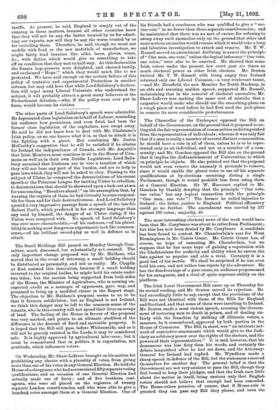On Wednesday, Mr. Shaw-Lefevre brought on his motion for prohibiting
any elector with a plurality of votes, from giving more than one of his votes in any General Election. He told the House of adergyman who had accumulated fifty separatevoting qualifications, and on occasion of one General Election had actually made use of forty ; and of five brothers, coal. agents, who were all placed on the registers of twenty separate London constituencies, and who were able to give a hundred votes amongst them at a, General Election. One of
his friends had a coachman who was qualified to give a "ser- vice vote" in no fewer than three separate constituencies ; and he maintained that there was no sort of excuse for refusing to sweep away such anomalies only on the ground that other anti more serious anomalies would remain which it would take a long and laborious investigation to attack and remove. Mr. T. W. Russell moved an amendment declining to assert the principle of" One man, one vote,' unless the logical inference" One vote, one value," were also to be asserted. He showed that some Irish voters under the present law exert just six times as much electoral power as other Irish electors. Mr. Sexton twitted Mr. T. W. Russell with being angry that Ireland returned only one Liberal Unionist,—a very irrelevant taunt, —and Mr. Bousfield, the new Member for North Hackney, in an able and amusing maiden speech, supported Mr. Russell, maintaining that in the removal of electoral anomalies, Mr. Shaw-Lefevre was making the same sort of mistake that a carpenter would make who should use the smoothing-plane on a rough piece of wood before he had first used the jack-plane to remove its more considerable protuberances.


































 Previous page
Previous page